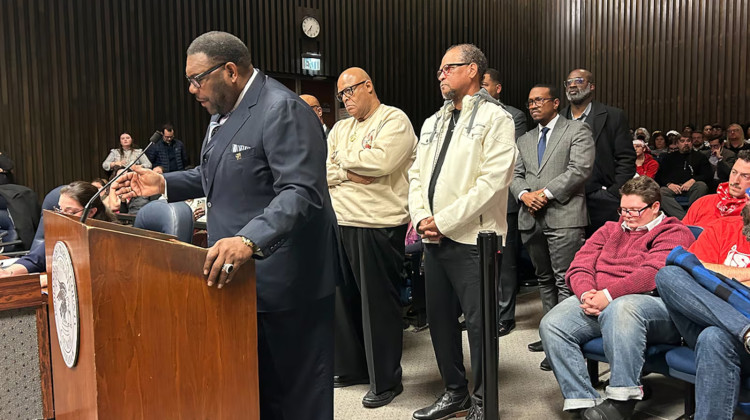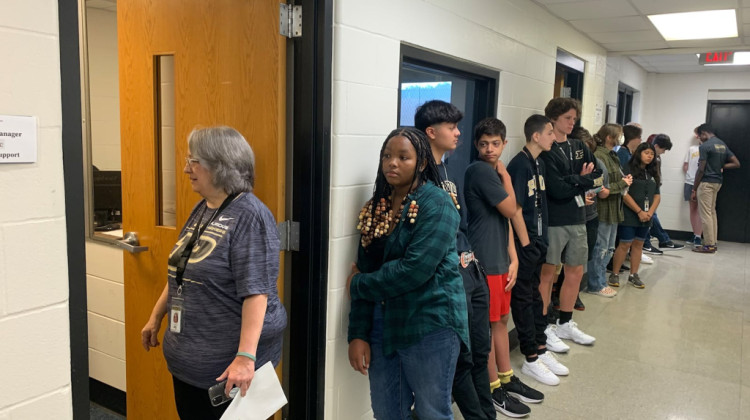
Indiana University faculty authored "An Open Letter on Academic Freedom at Indiana University, Bloomington" in response to U.S. Rep. Jim Banks.
Gage Skidmore / Wikimedia CommonsIndiana University faculty are speaking out against Rep. Jim Banks (R, IN-03), saying the congressman threatens academic freedom on Bloomington’s campus.
Banks wrote in a Nov. 16 letter to IU President Pamela Whitten that the university is failing to combat antisemitism. In his letter, Banks threatened IU could lose federal funding if the university condones or tolerates antisemitism on campus, and he demanded IU brief his office on antisemitic events by Dec.1. He also took aim at student activists, calling pro-Palestinian demonstrations "pro-terrorist."
IU Faculty’s “An Open Letter on Academic Freedom at Indiana University, Bloomington” was published online Nov. 19 in response. Faculty wrote they are “alarmed,” and their letter said Banks’ words “can only serve to further divide our students.”
Jeffrey Isaac, a James H. Rudy Professor in the Department of Political Science, is a co-author of the letter. He said the letter isn’t about taking sides between Israelis and Palestinians. It’s a show of solidarity, committing to academic freedom and freedom of expression for all students.
“This kind of political pressure and political interference — intended to pressure university administrators to quash certain kinds of expression on the grounds that it's hate speech or hate when it's really not — this is very dangerous,” Isaac said.
The full letter was posted online. It was co-signed by Purnima Bose, professor of English and international studies; Alex Lichtenstein, professor of history; and Benjamin Robinson, associate professor of Germanic studies. Faculty decided to go public with the piece after receiving 100 more signatures.
Isaac said he has not sent the letter to university leadership or administrators.
"We are alarmed by the threatening tone of the letter, the way in which it injects ideology into the proper governance of the university, and the way it conflates academic leadership with the policing of controversial ideas," the letter said. "We understand that antisemitism is a form of hate that has no place in a diverse and inclusive university. We feel the same way about all forms of bigotry, including anti-Arab and Islamophobic discrimination and hostility."
Many signers are part of IU’s American Association of University Professors chapter, Isaac said, an organization that firmly backs academic freedom. The number of signatures may grow as news of the letter circulates. IU is currently on break for Thanksgiving.
Banks lists three examples of what he considers antisemitic in his Nov. 16 letter, singling out demonstrations from IU's Palestinian Solidarity Committee. IU faculty said in the letter they strongly believe “it is essential to distinguish between real anti-Jewish conduct and pro-Palestinian advocacy.”
Isaac, who is Jewish, doesn’t believe pro-Palestinian or anti-Israel activism is antisemitic. Isaac said he’s fought antisemitism in the past in Bloomington and many other contexts.
“I haven't marched in any pro-Palestinian demonstrations, and a lot of what's said in them are things that I would never say myself,” Isaac said. “I don't happen to think a lot of those things, but other people do — smart people, some of them good people. They have a right to think and say those things without being charged with antisemitism or being accused of terrorism.”
The letter states it’s not uncommon for college students to have strong political positions, speak in ways that offend others, and push the limits of academic freedom. But, the letter continues, no administration should be pressured to label controversial political speech as a security threat or use legitimate safety concerns to stifle academic freedom.
Students may wear shirts with Israeli Defense Forces logos, chant “from the river to the sea Palestine will be free,” or hold vigils for people recently killed. Those demonstrations might upset people, Isaac said, but unless it incites violence — and no demonstrations on IU’s campus have — it’s free speech.
“It's also on a campus, a way that students learn to be citizens and to be informed individuals,” he said. “A lot of students do things and say things that when they’re students, that later on, they develop. They evolve their opinions. That's part of life. And it needs to be accepted and tolerated, nurtured on a campus, not shut down.”
 DONATE
DONATE






 Support WFYI. We can't do it without you.
Support WFYI. We can't do it without you.